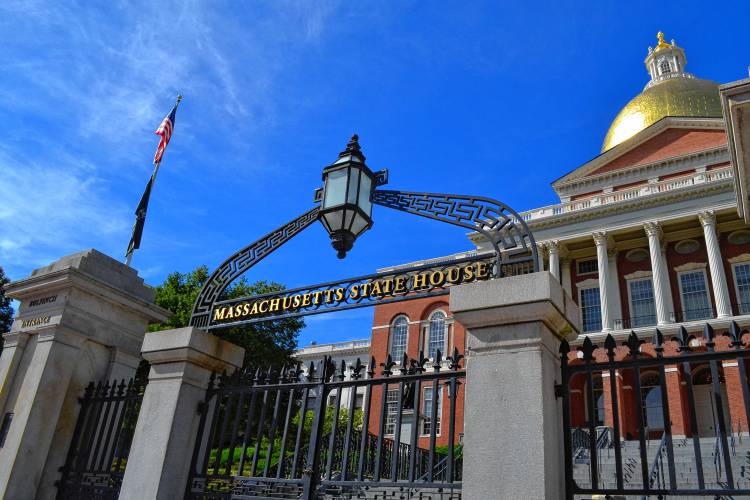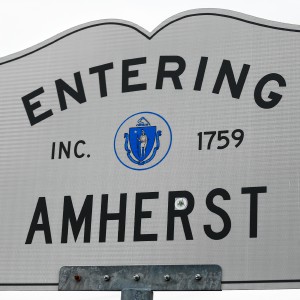Beacon Hill Roll Call, Oct. 23-27

The Massachusetts State House in Boston
| Published: 11-05-2023 8:41 AM |
THE HOUSE AND SENATE: Beacon Hill Roll Call records local senators’ votes from the week of October 23-27. There were no roll calls in the House last week.
MENSTRUAL PRODUCTS (S 2481): Senate 39-0, approved and sent to the House a bill that would require all prisons, homeless shelters and K-12 schools to maintain free menstrual products, including sanitary napkins, tampons and underwear liners in private and public restrooms and to make them available in a “convenient manner that does not stigmatize any persons seeking the products.”
Supporters say that according to the Massachusetts Menstrual Equity Coalition, approximately one in seven children in Massachusetts is living in poverty and struggles to pay for menstrual products. They argue that research shows that the inability to access menstrual products affects students’ class attendance.
They also note that women facing homelessness or who are incarcerated face high barriers to access, with Massachusetts shelters reporting that menstrual products are among the least donated items. They argue that restricted access in shelters and correctional facilities means that products can be used as bargaining chips and tools of control for people in vulnerable circumstances.
“I learned about this issue from young people in Medford High School, Somerville High School and Cambridge Rindge and Latin who took leadership at the local level to make menstrual hygiene products available in their own communities,” said sponsor Sen. Pat Jehlen (D-Somerville). “This is a true grassroots movement starting with girls talking about their experiences of missing valuable class time or feeling embarrassed to access products during the school day. These conversations have already started to change the culture and have motivated us to expand this across the state.”
“Period products are not luxuries, but necessities required for people’s basic needs, health and hygiene,” said Sen. Julian Cyr (D-Truro), Senate Chair of the Committee on Public Health. “Today’s passage of the … bill affirms that women and all menstruating people deserve access to menstrual products. An inaccessibility of period products speaks to the longstanding and persistent misogyny in our society, a bias that intersects with inequalities in housing, education, socioeconomics and beyond. By ensuring better access to these products, we support further access to essential health needs regardless of our situation in life.”
Article continues after...
Yesterday's Most Read Articles
 More than 130 arrested at pro-Palestinian protest at UMass
More than 130 arrested at pro-Palestinian protest at UMass
 Public gets a look at progress on Northampton Resilience Hub
Public gets a look at progress on Northampton Resilience Hub
 Northampton bans auto dealerships near downtown; zone change won’t affect Volvo operation on King Street
Northampton bans auto dealerships near downtown; zone change won’t affect Volvo operation on King Street
 UMass basketball: Bryant forward Daniel Rivera to be Minutemen’s first transfer of the offseason
UMass basketball: Bryant forward Daniel Rivera to be Minutemen’s first transfer of the offseason
 Town manager’s plan shorts Amherst Regional Schools’ budget
Town manager’s plan shorts Amherst Regional Schools’ budget
 Police respond to alcohol-fueled incidents in Amherst
Police respond to alcohol-fueled incidents in Amherst
During floor debate, Cyr commented, “I think it’s pretty obvious that if most men could menstruate, these products would be as ubiquitous and free as toilet paper.”
(A “Yes” vote is for the bill.)
Sen. Joanne Comerford, Yes; Sen. Paul Mark, Yes; Sen. Jacob Oliveira, Yes; Sen. John Velis, Yes
HIV PREVENTION DRUGS (S 2480): Senate 38-0, approved and sent to the House a bill that would allow pharmacists to prescribe, dispense and administer a short-term supply (60-days once in a two-year period) of HIV prevention drugs, known as pre-exposure prophylaxis (PrEP), to a patient without a prescription.
The bill requires pharmacists to provide counseling to the patient regarding the use of PrEP, to inform the patient’s primary care doctor that the pharmacist has prescribed the drug and to connect patients without a primary care provider with a health care provider for ongoing care and to obtain a prescription for PrEP
Under the bill, pharmacists could only prescribe PrEP to patients who have tested negative for HIV within the past seven days, do not have HIV symptoms and are not taking medications that are not safe to use with PrEP.
Supporters say that PrEP is a life-saving medication that is nearly 100 per cent effective in stopping the transmission of HIV. They note that that under current law, individuals who take PrEP must make an appointment and go through their doctor, a barrier that can stand in the way for people who need the medication on short notice, cannot make an appointment or cannot access medical care.
“PrEP is a game changer in HIV prevention. Yet, while this life-saving medication reduces the risk of transmission by 99 per cent, it remains inaccessible for too many,” said sponsor Sen. Julian Cyr (D-Truro), Senate Chair of the Committee on Public Health. “Allowing pharmacists to prescribe and dispense PrEP on a short-term basis, similar to what’s already allowed for contraceptives, would significantly increase the accessibility of this essential HIV prevention tool. With greater access to PrEP we can narrow the gap in PrEP utilization among LGBTQ+ people of color. I am someone who uses PrEP and most of my gay, bisexual and queer friends rely on it too. With this legislation, we are once again putting people at the center of our public health policy. I’m thrilled it has passed the Senate.”
“When someone is ready to begin PrEP, it is crucial that they are able to [do so] as soon as possible,” said Carrie Richgels, Manager of Policy and Advocacy at Fenway Health. “At Fenway Health, we regularly work to overcome barriers that patients face due to trauma, stigma and discrimination. We know from experience that to overcome these obstacles we must meet people where they are and build trust. Trust is essential to getting people on PrEP, and a local pharmacy can provide a lower threshold of access and can be a trusted access point for those who may face discrimination in traditional healthcare settings.”
(A “Yes” vote is for the bill.)
Sen. Joanne Comerford, Yes; Sen. Paul Mark, Yes; Sen. Jacob Oliveira, Yes; Sen. John Velis, Yes
REQUIRE TRAINING COURSES FOR MEMBERS OF SEVERAL LOCAL BOARDS IN CITIES AND TOWNS (H 2047): The Municipalities and Regional Government Committee held a hearing on legislation that would require new members of local boards of health, conservation commissions, planning boards and zoning boards of appeals to attend a free state-sponsored program of education and training annually.
“Members of local regulatory boards and commissions make consequential decisions that directly impact their communities,” said sponsor Rep. Chris Flanagan (D-Dennis). “There are many members steeped in town bylaws and state regulations. However, there are many appointed and elected members who do not have this expertise or knowledge base. [The bill’s] objective is to support local board and commission members in their work and give members a baseline understanding of laws and procedures to assist them in their deliberations.”
FENTANYL STRIPS (H 2009): The Committee on Mental Health, Substance Use and Recovery held a hearing on a proposal that would create a pilot program for the purpose of implementing and studying the efficacy of fentanyl testing strips in combating the increasing rate of opioid-related deaths of individuals addicted to opioids and other substances. These small strips of paper are used to detect the presence of fentanyl in many different kinds of drugs including cocaine, methamphetamine and heroin.
“I decided to sponsor this bill because there were 2,301 opioid-related overdose deaths [in Massachusetts] in 2021 and according to the National Institute on Drug Abuse, synthetic opiates, mainly fentanyl, accounted for 90 percent of all opioid-related deaths in Massachusetts,” said sponsor Rep. Smitty Pignatelli (D-Lenox). “Fentanyl testing strips – and the pilot program that this legislation creates – can protect against the pervasive threat of fentanyl exposure in our neighborhoods, our homes, our schools and our communities.”
MAGIC MUSHROOM THERAPY (S 1263): Another measure heard by the Mental Health, Substance Use and Recovery Committee would establish a psilocybin-assisted therapy pilot program operated by the state Bureau of Substance Use Addiction Services to provide qualified patients with the funding necessary to receive psilocybin-assisted therapy as part of any expanded access program approved by the federal Food and Drug Administration. Psilocybin is a hallucinogenic substance found in magic mushrooms and is used to treat mental health disorders including major depressive disorder and substance abuse.
“There is mounting evidence from over 50 years of medical studies that suggest psilocybin has potential as a form of treatment for a variety of disorders, particularly substance use disorder,” said Sen. Susan Moran (D-Falmouth). “This bill is a proactive step towards establishing a framework for the medicinal use of psilocybin and bringing a potentially revolutionary therapy to those suffering from mental health disorders.”
ELECTRIC VEHICLE (EV) CHARGING STATIONS IN CONDO PARKING SPACES (S 852): The Housing Committee’s hearing included a bill that would prevent condominium associations from prohibiting or unreasonably restricting owners from installing EV charging equipment in or near an owner’s parking space. Restrictions that significantly increase the cost of the equipment, decrease its efficiency or effectively prohibit its installation would not be permitted. The bill would also require owners to pay the costs of installing and maintaining the charging equipment and for the costs of the electricity consumed during charging.
“The commonwealth needs to install hundreds of thousands of residential electric vehicle charging stations to meet its goals for EV adoption, but at the moment, condominium associations can prevent owners from installing them,” said sponsor Sen. Cindy Creem (D-Newton). “We need to clear away unreasonable obstacles to installing EV charging stations at condominiums, not only because we will need those charging stations to reach our climate obligations, but also because condo owners deserve the right to charge.”
OPT OUT OF YOUR TAX DOLLARS GOING TO ABORTION SERVICES (H 2887): The Revenue Committee held a hearing on legislation that would give taxpayers the option to indicate on their state income tax return that they do not want any portion of their income tax liability to be utilized for abortion services.
“I believe that taxpayers should have the option to not have their money used - directly or indirectly - to fund abortion activities that they find morally reprehensible,” said Rep. Joseph McKenna (R-Webster). “People should not be forced, through the use of their taxes, to support this industry that has taken the lives of millions of unborn babies.”
USE INCOME TAX RETURN TO MAKE VOLUNTARY CONTRIBUTIONS TO FIREFIGHTERS ACADEMY TRUST FUND (S 2446): Another proposal before the Revenue Committee would give taxpayers the option on their tax return to donate to the Massachusetts Fire Fighters Academy Trust Fund. According to its website, the academy “trains municipal fire service personnel at no cost to cities and towns … and also offers fire officer training and over 300 continuing education courses.”
“I filed the legislation because firefighters, including in my district of Western Massachusetts, provide a critical service and are the safety backbones of our communities,” said Sen. Jake Oliveira (D-Ludlow). “Passing this legislation will contribute to a more robust workforce. ”
CREATE A STATE-OWNED BANK (S 682/H 975): Legislation that would establish a publicly owned, state-run Bank of Massachusetts was the subject of a hearing before the Financial Services Committee. The bank would be capitalized with $200 million in state funds deposited over four years. Its deposits of approximately $1.4 billion would be drawn from existing state revenues currently invested out-of-state.
The bank would provide affordable financing to small and medium-sized businesses, especially in under-served communities; assist businesses and municipalities in recovering from the economic repercussions of external shocks, including pandemics, recessions and natural disasters; respond to the unmet affordable financing needs of cities and towns in the commonwealth; address the historic and current disadvantages experienced by the state’s minority and women-owned enterprises by providing affordable financing; and increase available affordable housing options for all Bay State residents.
Bob Katzen welcomes feedback at bob@beaconhillrollcall.com

 State Senate budget funds free community college for all
State Senate budget funds free community college for all ‘We can just be who we are’: Thousands show support for LGBTQ community at Hampshire Pride
‘We can just be who we are’: Thousands show support for LGBTQ community at Hampshire Pride Doors open at Tilton Library’s temporary home at South Deerfield Congregational Church
Doors open at Tilton Library’s temporary home at South Deerfield Congregational Church Area property deed transfers, May 2
Area property deed transfers, May 2
